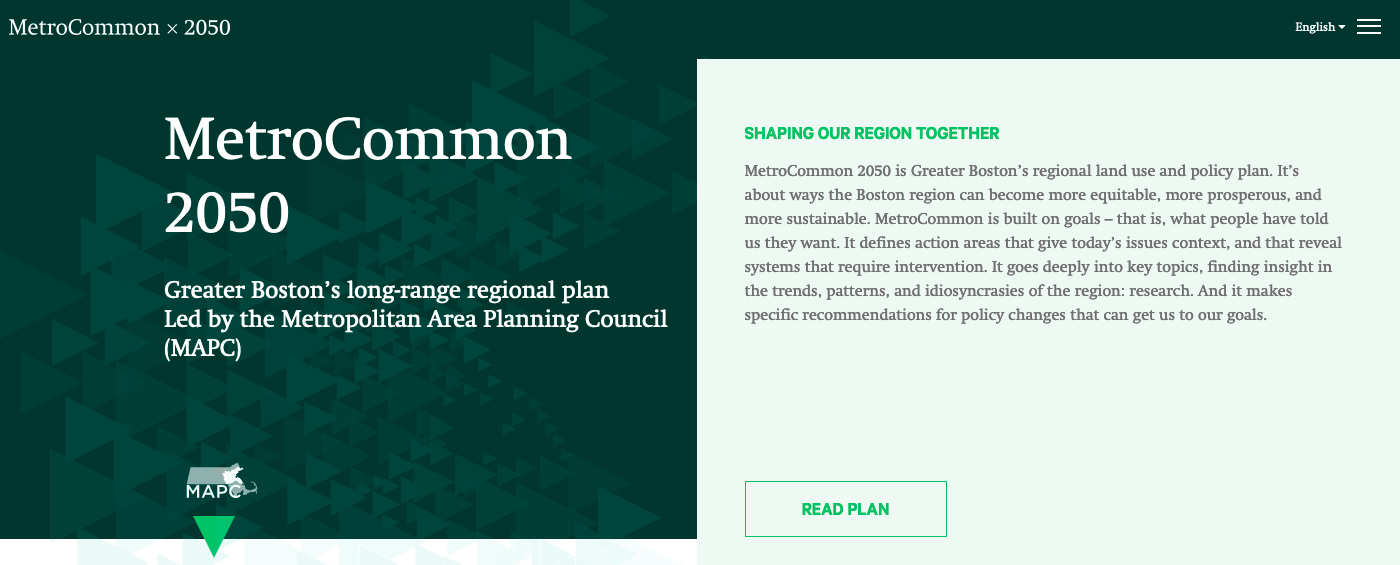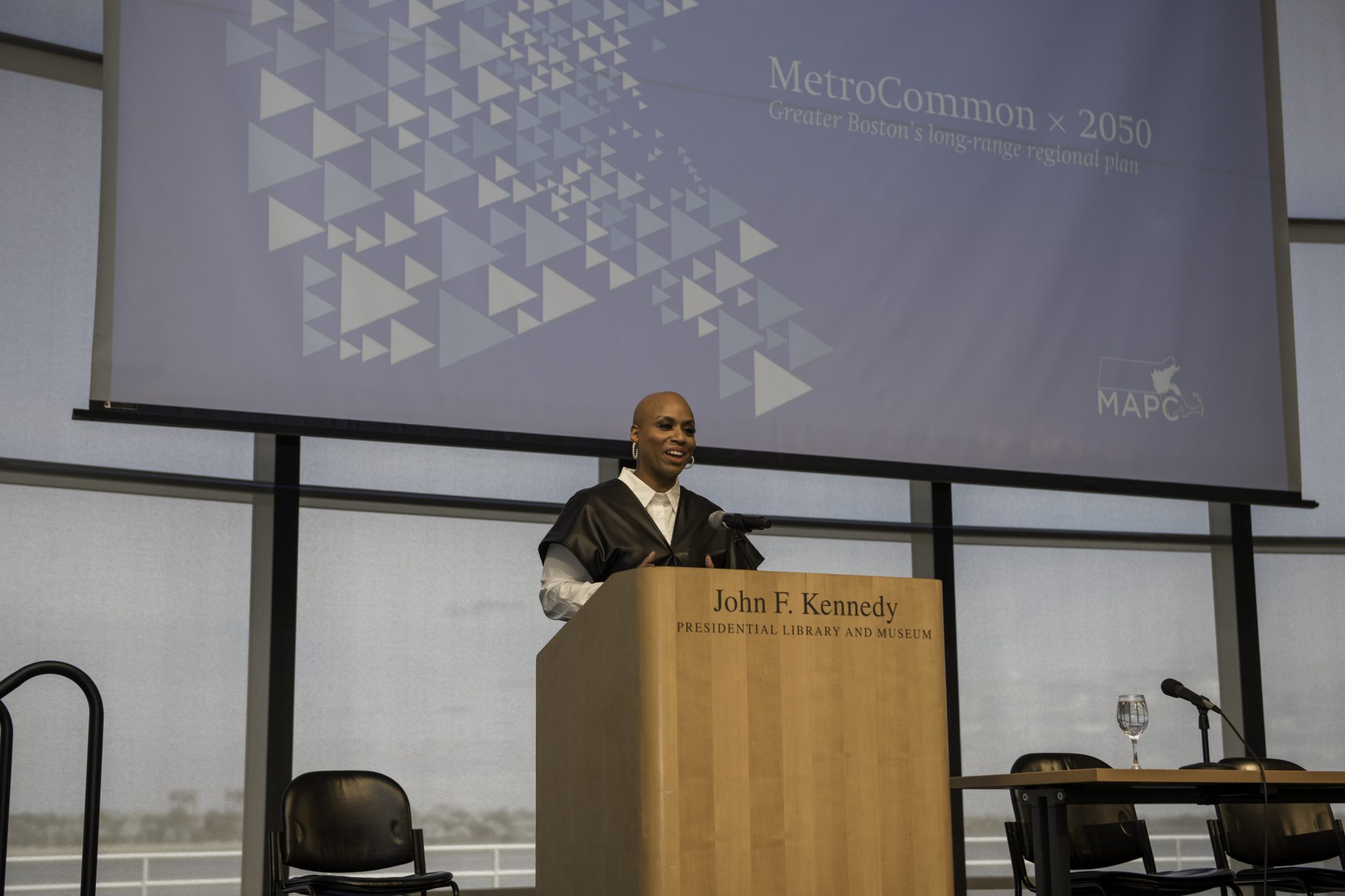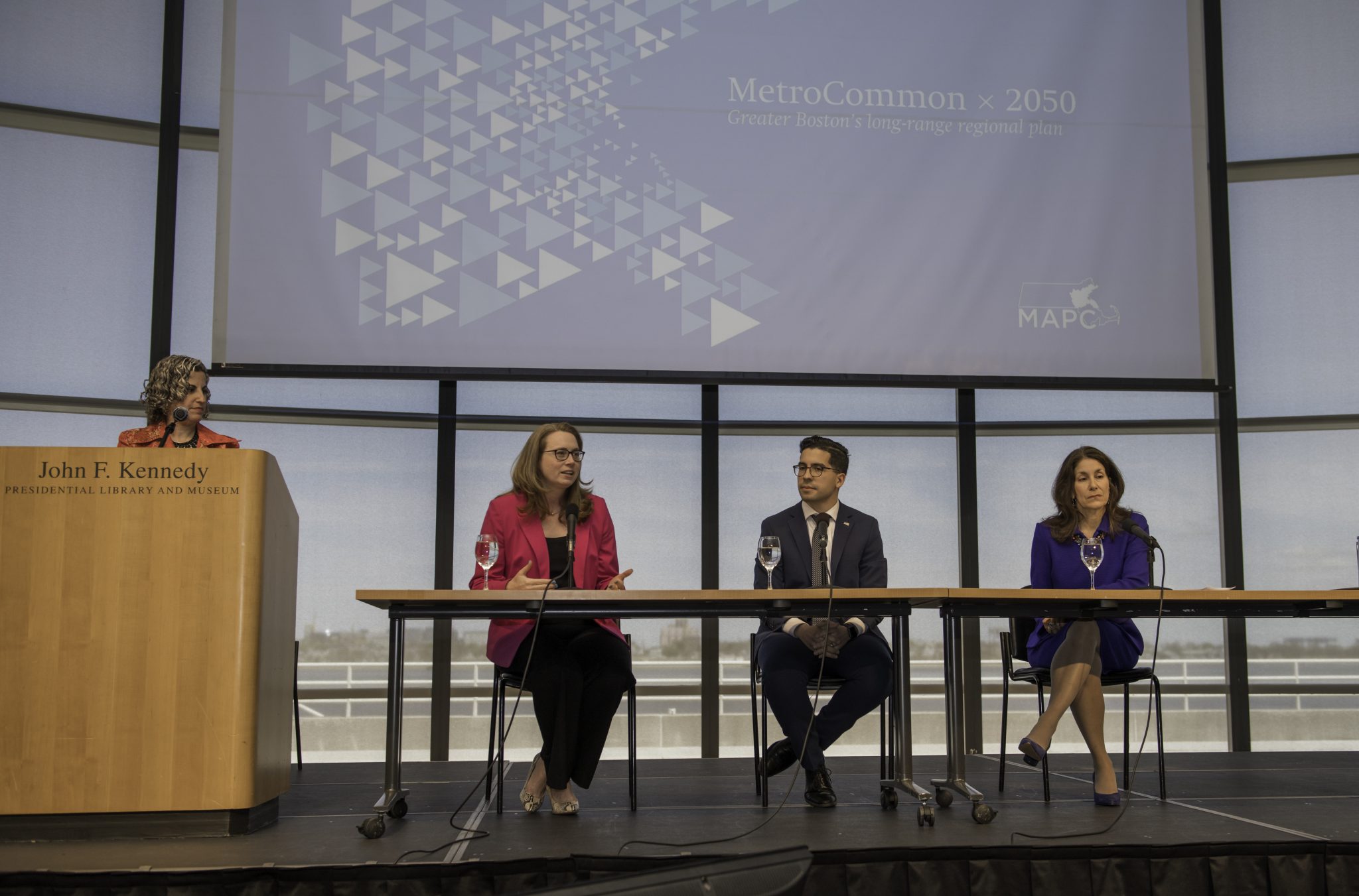MAPC Launches ‘MetroCommon 2050: Shaping our Region Together’
New long-range land use and public policy plan offers a vision and practical steps toward a more equitable and resilient future for Greater Boston
BOSTON – May 5, 2022– Flanked by Congresswoman Ayanna Pressley, MA-07, and scores of public officials and stakeholders from across Greater Boston this week, the Metropolitan Area Planning Council (MAPC) officially unveiled a land use and public policy blueprint designed to put the region on a course toward a more equitable, sustainable and prosperous future.
Developed through grassroots research, analysis, and public outreach over the past three years, MetroCommon 2050: Shaping our Region Together details five “Action Areas” including Growth & Mobility, Homes for Everyone, Equity of Wealth & Health, Dynamic & Representative Government, and Climate Change Adaptation & Resiliency – and outlines bold, achievable goals for the 101 cities and towns within the MAPC’s planning territory, along with useful research and tools to ensure success.
The Action Areas were informed by four core values Greater Boston residents and workers identified as crucial for the region’s success: equity, resilience, prosperity, and stewardship.
“We are charting an inclusive vision of the future of the region, and we do that together,” said Congresswoman Pressley in her keynote remarks at the launch event, noting the importance of regional planning in improving outcomes for residents across the socio-economic spectrum. “These last two years have showed us that our destinies are tied, and we don’t improve outcomes by doing what we’ve always done. We can, and we must, legislate equity, healing, and justice.”
MAPC Executive Director Marc Draisen dedicated the plan to victims of the COVID-19 pandemic.
“MetroCommon 2050 launches at a time when we face unprecedented challenges fueled by a devastating pandemic, increased political polarization, an urgent climate crisis, and a recognition of the impact racism has had on our past and present,” said Draisen. This plan acknowledges how these global, national, regional and local events affect us all, and looks to the future of Greater Boston with hope, knowing that, together, this region has the power and ability to bring about the change we desire.”
Draisen and other MAPC staff introduced MetroCommon 2050 at an event Thursday morning hosted by the John F. Kennedy Library in Columbia Point, and attended by over 200 elected and appointed Greater Boston officials, non-profit leaders, project stakeholders, community non-profit partners and others.
In addition to interactive booths and exhibits matching Action Area themes, the event featured a moderated panel led by MAPC Deputy Executive Director of Public Affairs & Advocacy Elizabeth Weyant, featuring State Representatives Christine Barber, Andy Vargas, and Michelle Ciccolo.
MAPC based the new regional roadmap on a robust information gathering process that included tours of the region, and interviews as well as focus groups with residents, planners, and municipal and state leaders. That feedback - including over 600 survey responses - painted a portrait of what those who live and work in Metropolitan Boston want for the region by 2050. The plan acknowledges challenges such as historic exclusion, oppression, and unfairness that continue today, and outlines ways to overcome them while grasping untapped possibilities to ensure that the region protects its natural resources, is prepared for climate change, invests in downtowns and neighborhoods, and provides opportunities for all residents and workers to thrive.
Grouped within the five Action Areas, MetroCommon 2050 identifies ten general goals for the region, along with specific strategies and proposed policies for achieving them. The goals include:
- Getting Around the Region: traveling around Metro Boston is safe, affordable, convenient, and enjoyable.
- Homes for All: All residents of Metro Boston have places to live that meet their needs, and that they can afford.
- A Climate Resilient Region: Metro Boston is prepared for – and resilient to – the impacts of climate change.
- A Net Zero Carbon Region: the Metro Boston region is highly energy efficient and has reduced its greenhouse gas emissions to net zero.
- Dynamic and Representative Governments: Local governments and regional agencies have the capacity and resources to deliver the services and supports our residents deserve, and to maintain and invest in our built and natural environments.
- A Healthy Environment: Greater Boston’s air, water, land, and other natural resources are clean and protected – for people and for the rest of the ecosystem.
- Economic Security: Everyone has the financial resources to meet their needs and to live fulfilling lives.
- Economic Prosperity: Greater Boston’s economy benefits all in the region.
- Healthy and Safe Neighborhoods: People are safe, healthy, and connected to one another.
- Thriving Arts, Culture, and Heritage: Greater Boston is full of unique places and experiences that bring joy and foster diversity and social cohesion.
Since MetroCommon 2050 is a land use and policy plan designed for practical use, MAPC is scheduling meetings with residents and officials throughout its 101-municipality region to make connections and jumpstart conversations toward next steps in realizing the plan’s vision. Presentations are available for public gatherings or internal meetings, and MAPC staff will tailor the content to each community’s needs. Governmental bodies and non-governmental organizations, interested in finding out what MetroCommon 2050 means for their communities, can sign up for presentations online.
For more information about MAPC, visit www.mapc.org. To interact with the MetroCommon plan, visit http://metrocommon.mapc.org.
Photos
Press Contact
Amanda Linehan
Communications Director
[email protected]
Photos are free to use. Credit the Metropolitan Area Planning Council (MAPC).



